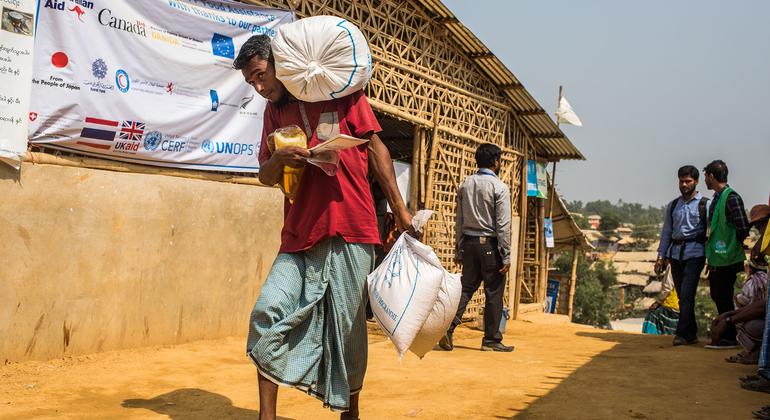Guterres calls for end to violence in Myanmar, repression of Rohingya


About a million Rohingya are taking refuge in Bangladesh and more than 130,000 others have sought safe haven across the region with no immediate prospect of repatriation, António Guterres said in a statement issued by his spokesman on Friday — just ahead of Sunday’s somber anniversary.
“The security and humanitarian situation is dire with ongoing access challenges. has exacerbated the inherent weaknesses of the Myanmar people.including the Rohingya, People continue to face discrimination and repression as armed conflict escalates in Rakhine State”, the statement said.
The secretary-general called on all parties to the conflict – which is ongoing between troops loyal to the ruling military government and numerous armed groups fighting for autonomy or independence – “to end the violence and ensure the protection of civilians in accordance with applicable international human rights standards and international humanitarian law.
The deteriorating situation leaves ‘no path to safety’
Thousands of civilians People in Myanmar’s western Rakhine state have been forced to flee by land as separatist Arakan Army fighters continue to push them into locations with insufficient safe shelters, human rights chief Volker Türk warned on Friday.
The violence is believed to have left hundreds of civilians dead as they tried to flee the fighting.
“As the border crossings with Bangladesh remain closed, Members of the Rohingya community are finding themselves caught between the military and its allies and the Arakan Army.“There is no path to safety,” Mr. Türk warned.
The situation has worsened over the past four months as tens of thousands of people, many of them members of the Rohingya Muslim minority, have fled a major offensive by the Arakan Army insurgents, an ethnic armed group aiming to seize control of towns from the Myanmar military.
The historical tragedy continues
Human rights chief stresses that this August marks Seven years since military operations in Myanmar pushed 700,000 people across the border into Bangladesh.
“Despite the world saying ‘never again,’ we are once again witnessing killing, destruction and displacement in Rakhine,” said Mr. Türk.
In one of the deadliest recent attacks along the Naf River bordering Bangladesh on August 5, dozens of people were reported killed, including armed dronesAlthough it is still unclear who is responsible.
“Parties to armed conflicts are issuing statements denying responsibility for attacks against the Rohingya and others, act as if they are powerless to protect them. This goes beyond the bounds of gullibility.Mr. Türk went on to stress the obligation of all parties under international humanitarian law to protect the Rohingya from further harm.
‘Clear response’ needed
The military and the Arakan Army have committed serious human rights violations and abuses against the Rohingya, including abductions, forced recruitment, indiscriminate bombing of towns and villages with drones and artillery, and murder – some involving beheadings.
In addition, a growing number of Rohingya, nearly half of whom are children, are seeking assistance for conflict-related injuries, including deaths from diarrhea caused by lack of clean water and extremely poor living conditions.
“These atrocities demand a clear response – Those responsible must be held accountable and justice must be relentlessly pursued.“, said Mr. Türk.
“The recurrence of past crimes and horrors must be prevented as a moral obligation and a legal necessity. It is the responsibility of the international community, of ASEAN [Association of Southeast Asian Nations] “First and foremost, all necessary measures must be taken to protect the Rohingya and other civilian victims of this brutal conflict,” the human rights chief concluded.


